STM32存储左右互搏 I2C总线FATS读写EEPROM ZD24C1MA
STM32存储左右互搏 I2C总线FATS读写EEPROM ZD24C1MA
在较低容量存储领域,EEPROM是常用的存储介质,可以通过直接或者文件操作方式进行读写。不同容量的EEPROM的地址对应位数不同,在发送字节的格式上有所区别。EEPROM是非快速访问存储,因为EEPROM按页进行组织,在连续操作模式,当跨页时访问地址不是跳到下一页到开始,而是跳到当前页的首地址,因此跨页时要重新指定起始地址。而在控制端发送写操作I2C数据后还需要有等待EEPROM内部操作完成的时间才能进行下一次操作。ZD24C1MA是1M bit / 128K Byte容量的EEPROM,ZD24C1MA的管脚定义为:
![]()
这里介绍STM32 通过文件系统FATS访问EEPROM ZD24C1MA的例程。采用STM32CUBEIDE开发平台,以STM32F401CCU6芯片为例,通过STM32 I2C硬件电路实现读写操作,通过UART串口进行控制。
STM32工程配置
首先建立基本工程并设置时钟:
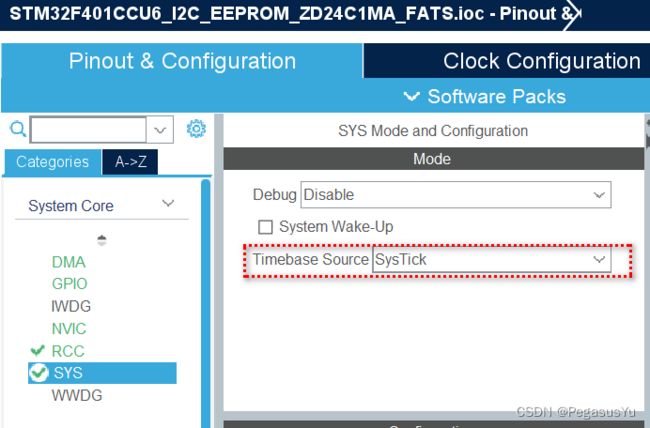
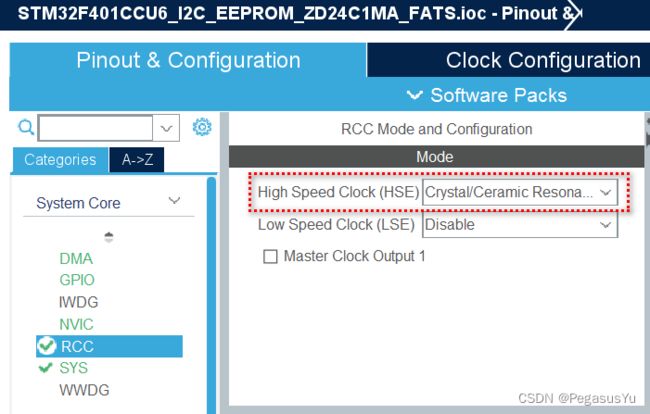
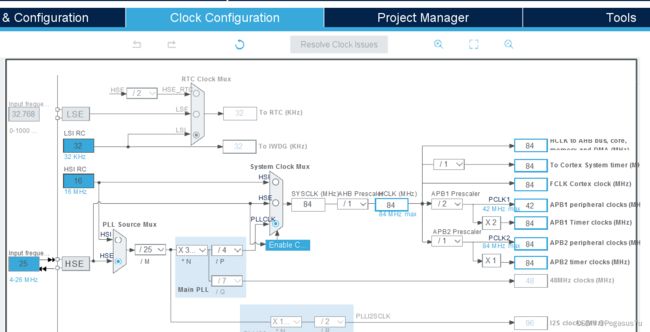
配置硬件I2C接口,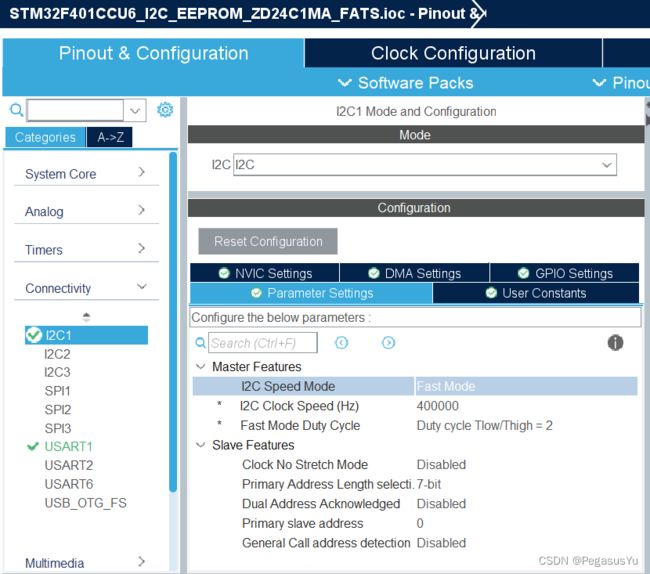
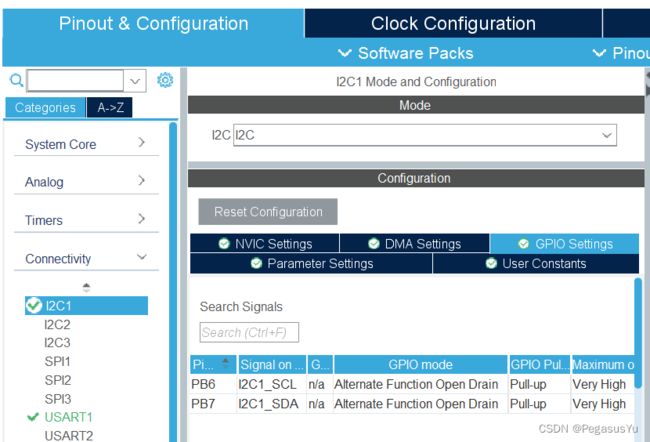
配置UART1作为通讯串口:
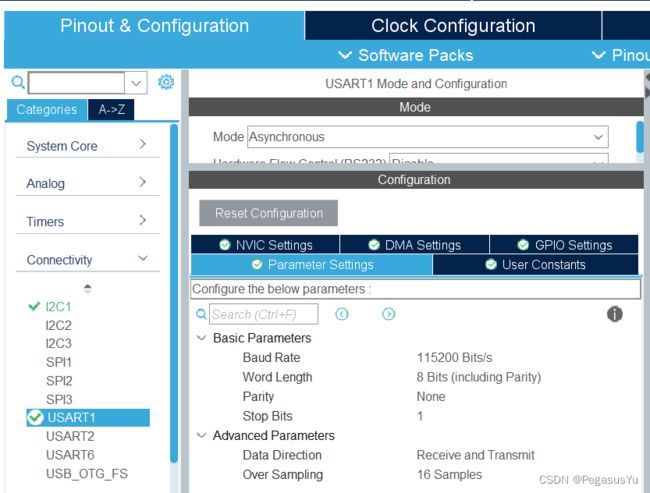
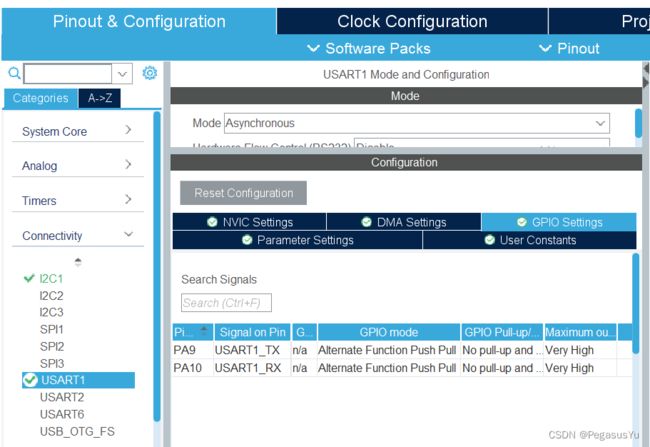
对FATS文件系统进行配置:
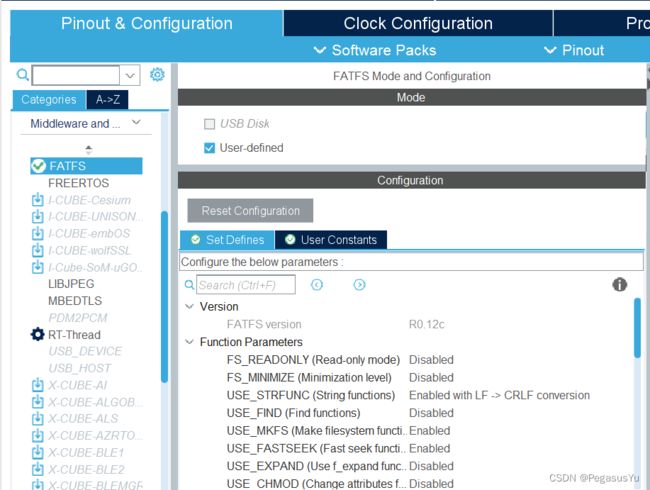
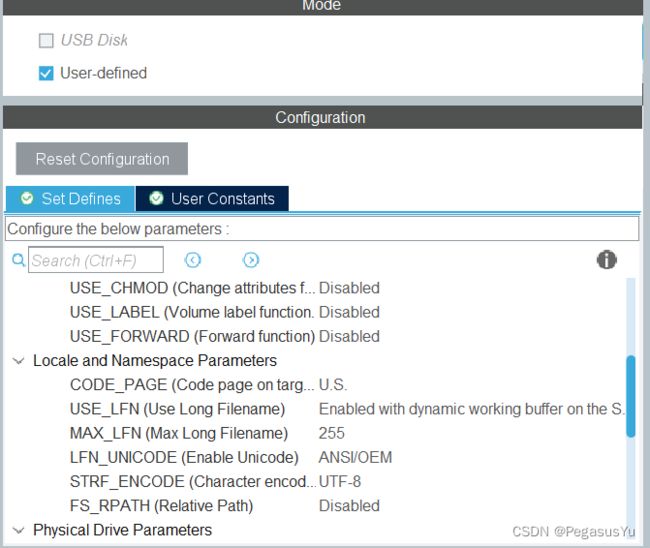
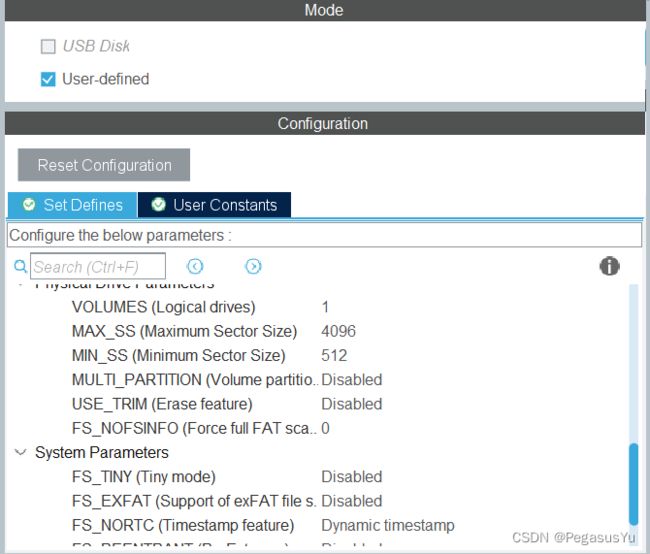

保存并生成初始工程代码:
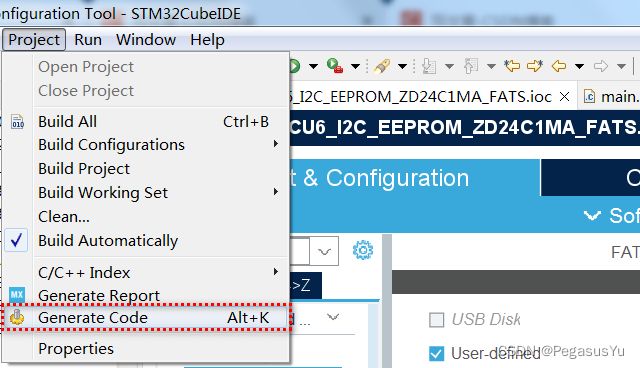
STM32工程代码
代码里用到的微秒延时函数参考: STM32 HAL us delay(微秒延时)的指令延时实现方式及优化
ZD24C1MA的设备默认访问地址为0xA0, ZD24C1MA的存储单元地址访问略为特殊,17位地址分为两部分,最高位的1位放置于I2C设备默认访问地址的第1位,I2C设备默认访问地址第0位仍然为读写控制位,由于采用硬件I2C控制,库函数自行通过识别调用的是发送还是接收函数对第0位进行发送前设置,因此,不管是调用库函数的I2C写操作还是读操作,提供的地址相同。17位地址的低16位通过在发送设备地址后的作为跟随的第一,二个字节发送。
建立ZD24C1MA.h库头文件
#ifndef INC_ZD24C1MA_H_
#define INC_ZD24C1MA_H_
#include "main.h"
void PY_Delay_us_t(uint32_t Delay);
void ZD24C1MA_Read(uint32_t addr, uint8_t * data, uint32_t len);
void ZD24C1MA_Write(uint32_t addr, uint8_t * data, uint32_t len);
#endif
建立ZD24C1MA.c库源文件:
#include #include "main.h"
#include "stm32f4xx_hal.h"
#include "ZD24C1MA.h"
修改user_diskio.c,对文件操作函数与底层I2C读写提供连接:
/* USER CODE BEGIN Header */
/**
******************************************************************************
* @file user_diskio.c
* @brief This file includes a diskio driver skeleton to be completed by the user.
******************************************************************************
* @attention
*
* Copyright (c) 2023 STMicroelectronics.
* All rights reserved.
*
* This software is licensed under terms that can be found in the LICENSE file
* in the root directory of this software component.
* If no LICENSE file comes with this software, it is provided AS-IS.
*
******************************************************************************
*/
/* USER CODE END Header */
#ifdef USE_OBSOLETE_USER_CODE_SECTION_0
/*
* Warning: the user section 0 is no more in use (starting from CubeMx version 4.16.0)
* To be suppressed in the future.
* Kept to ensure backward compatibility with previous CubeMx versions when
* migrating projects.
* User code previously added there should be copied in the new user sections before
* the section contents can be deleted.
*/
/* USER CODE BEGIN 0 */
/* USER CODE END 0 */
#endif
/* USER CODE BEGIN DECL */
/* Includes ------------------------------------------------------------------*/
#include 然后在main.c里根据串口输入命令(16进制单字节)实现如下功能:
0x01. 读取EEPROM ID
0x02. 装载FATS文件系统
0x03: 创建/打开文件并从头位置写入数据
0x04: 打开文件并从头位置读入数据
0x05: 创建/打开文件并从特定位置写入数据
0x06: 打开文件并从特定位置读入数据
完整的代码实现如下:
/* USER CODE BEGIN Header */
/**
******************************************************************************
* @file : main.c
* @brief : Main program body
******************************************************************************
* @attention
*
* Copyright (c) 2023 STMicroelectronics.
* All rights reserved.
*
* This software is licensed under terms that can be found in the LICENSE file
* in the root directory of this software component.
* If no LICENSE file comes with this software, it is provided AS-IS.
*
******************************************************************************
*/
//Written by Pegasus Yu in 2023
/* USER CODE END Header */
/* Includes ------------------------------------------------------------------*/
#include "main.h"
#include "fatfs.h"
/* Private includes ----------------------------------------------------------*/
/* USER CODE BEGIN Includes */
#include "usart.h"
#include "string.h"
#include "ZD24C1MA.h"
/* USER CODE END Includes */
/* Private typedef -----------------------------------------------------------*/
/* USER CODE BEGIN PTD */
/* USER CODE END PTD */
/* Private define ------------------------------------------------------------*/
/* USER CODE BEGIN PD */
__IO float usDelayBase;
void PY_usDelayTest(void)
{
__IO uint32_t firstms, secondms;
__IO uint32_t counter = 0;
firstms = HAL_GetTick()+1;
secondms = firstms+1;
while(uwTick!=firstms) ;
while(uwTick!=secondms) counter++;
usDelayBase = ((float)counter)/1000;
}
void PY_Delay_us_t(uint32_t Delay)
{
__IO uint32_t delayReg;
__IO uint32_t usNum = (uint32_t)(Delay*usDelayBase);
delayReg = 0;
while(delayReg!=usNum) delayReg++;
}
void PY_usDelayOptimize(void)
{
__IO uint32_t firstms, secondms;
__IO float coe = 1.0;
firstms = HAL_GetTick();
PY_Delay_us_t(1000000) ;
secondms = HAL_GetTick();
coe = ((float)1000)/(secondms-firstms);
usDelayBase = coe*usDelayBase;
}
void PY_Delay_us(uint32_t Delay)
{
__IO uint32_t delayReg;
__IO uint32_t msNum = Delay/1000;
__IO uint32_t usNum = (uint32_t)((Delay%1000)*usDelayBase);
if(msNum>0) HAL_Delay(msNum);
delayReg = 0;
while(delayReg!=usNum) delayReg++;
}
/* USER CODE END PD */
/* Private macro -------------------------------------------------------------*/
/* USER CODE BEGIN PM */
/* USER CODE END PM */
/* Private variables ---------------------------------------------------------*/
I2C_HandleTypeDef hi2c1;
DMA_HandleTypeDef hdma_i2c1_tx;
UART_HandleTypeDef huart1;
/* USER CODE BEGIN PV */
/* USER CODE END PV */
/* Private function prototypes -----------------------------------------------*/
void SystemClock_Config(void);
static void MX_GPIO_Init(void);
static void MX_DMA_Init(void);
static void MX_I2C1_Init(void);
static void MX_USART1_UART_Init(void);
/* USER CODE BEGIN PFP */
/* USER CODE END PFP */
/* Private user code ---------------------------------------------------------*/
/* USER CODE BEGIN 0 */
uint8_t cmd=0; //for status control
uint8_t URX;
uint8_t ZD24C1MA_Default_I2C_Addr = 0xA0; //Pin A2=A1=0
uint32_t ZD24C1MA_Access_Addr = 0; //EEPROM ZD24C1MA access address (17-bit)
uint8_t EEPROM_mount_status = 0; //EEPROM fats mount status indication (0: unmount; 1: mount)
uint8_t FATS_Buff[_MAX_SS]; //Buffer for f_mkfs() operation
FRESULT retEEPROM;
FIL file;
FATFS *fs;
UINT bytesread;
UINT byteswritten;
uint8_t rBuffer[20]; //Buffer for read
uint8_t WBuffer[20] ={1,2,3,4,5,6,7,8,9,10,11,12,13,14,15,16,17,18,19,20}; //Buffer for write
#define user_sector_byte_size 512
uint8_t eeprombuffer[user_sector_byte_size];
extern char USERPath[4];
char * console;
/* USER CODE END 0 */
/**
* @brief The application entry point.
* @retval int
*/
int main(void)
{
/* USER CODE BEGIN 1 */
EEPROM_mount_status = 0;
uint32_t EEPROM_Read_Size;
extern char USERPath[4];
char * dpath = "0:"; //Disk Path
for(uint8_t i=0; i<4; i++)
{
USERPath[i] = *(dpath+i);
}
const TCHAR* filepath = "0:test.txt";
char cchar[256];
console = cchar;
/* USER CODE END 1 */
/* MCU Configuration--------------------------------------------------------*/
/* Reset of all peripherals, Initializes the Flash interface and the Systick. */
HAL_Init();
/* USER CODE BEGIN Init */
/* USER CODE END Init */
/* Configure the system clock */
SystemClock_Config();
/* USER CODE BEGIN SysInit */
/* USER CODE END SysInit */
/* Initialize all configured peripherals */
MX_GPIO_Init();
MX_DMA_Init();
MX_I2C1_Init();
MX_USART1_UART_Init();
MX_FATFS_Init();
/* USER CODE BEGIN 2 */
PY_usDelayTest();
PY_usDelayOptimize();
HAL_UART_Receive_IT(&huart1, &URX, 1);
/* USER CODE END 2 */
/* Infinite loop */
/* USER CODE BEGIN WHILE */
while (1)
{
if(cmd==1) //Read ID
{
cmd = 0;
printf("EEPROM ID=ZD24C1MAT\r\n\r\n");
}
else if(cmd==2) //EEPROM File System Mount
{
cmd = 0;
retEEPROM=f_mount(&USERFatFS, (TCHAR const*)USERPath, 1);
if (retEEPROM != FR_OK)
{
printf("File system mount failure: %d\r\n", retEEPROM);
if(retEEPROM==FR_NO_FILESYSTEM)
{
printf("No file system. Now to format......\r\n");
retEEPROM = f_mkfs((TCHAR const*)USERPath, FM_FAT, 1024, FATS_Buff, sizeof(FATS_Buff)); //EEPROM formatting
if(retEEPROM == FR_OK)
{
printf("EEPROM formatting success!\r\n");
}
else
{
printf("EEPROM formatting failure!\r\n");
}
}
}
else
{
EEPROM_mount_status = 1;
printf("File system mount success\r\n");
}
}
else if(cmd==3) //File creation and write
{
cmd = 0;
if(EEPROM_mount_status==0)
{
printf( "\r\nEEPROM File system not mounted: %d\r\n",retEEPROM);
}
else
{
retEEPROM = f_open( &file, filepath, FA_CREATE_ALWAYS | FA_WRITE ); //Open or create file
if(retEEPROM == FR_OK)
{
printf( "\r\nFile open or creation successful\r\n");
retEEPROM = f_write( &file, (const void *)WBuffer, sizeof(WBuffer), &byteswritten); //Write data
if(retEEPROM == FR_OK)
{
printf("\r\nFile write successful\r\n");
}
else
{
printf("\r\nFile write error: %d\r\n",retEEPROM);
}
f_close(&file); //Close file
}
else
{
printf("\r\nFile open or creation error %d\r\n",retEEPROM);
}
}
}
else if(cmd==4) //File read
{
cmd = 0;
if(EEPROM_mount_status==0)
{
printf("\r\nEEPROM File system not mounted: %d\r\n",retEEPROM);
}
else
{
retEEPROM = f_open( &file, filepath, FA_OPEN_EXISTING | FA_READ); //Open file
if(retEEPROM == FR_OK)
{
printf("\r\nFile open successful\r\n");
retEEPROM = f_read( &file, (void *)rBuffer, sizeof(rBuffer), &bytesread); //Read data
if(retEEPROM == FR_OK)
{
printf("\r\nFile read successful\r\n");
PY_Delay_us_t(200000);
EEPROM_Read_Size = sizeof(rBuffer);
for(uint16_t i = 0;i < EEPROM_Read_Size;i++)
{
printf("%d ", rBuffer[i]);
}
printf("\r\n");
}
else
{
printf("\r\nFile read error: %d\r\n", retEEPROM);
}
f_close(&file); //Close file
}
else
{
printf("\r\nFile open error: %d\r\n", retEEPROM);
}
}
}
else if(cmd==5) //File locating write
{
cmd = 0;
if(EEPROM_mount_status==0)
{
printf("\r\nEEPROM File system not mounted: %d\r\n",retEEPROM);
}
else
{
retEEPROM = f_open( &file, filepath, FA_CREATE_ALWAYS | FA_WRITE); //Open or create file
if(retEEPROM == FR_OK)
{
printf("\r\nFile open or creation successful\r\n");
retEEPROM=f_lseek( &file, f_tell(&file) + sizeof(WBuffer) ); //move file operation pointer, f_tell(&file) gets file head locating
if(retEEPROM == FR_OK)
{
retEEPROM = f_write( &file, (const void *)WBuffer, sizeof(WBuffer), &byteswritten);
if(retEEPROM == FR_OK)
{
printf("\r\nFile locating write successful\r\n");
}
else
{
printf("\r\nFile locating write error: %d\r\n", retEEPROM);
}
}
else
{
printf("\r\nFile pointer error: %d\r\n",retEEPROM);
}
f_close(&file); //Close file
}
else
{
printf("\r\nFile open or creation error %d\r\n",retEEPROM);
}
}
}
else if(cmd==6) //File locating read
{
cmd = 0;
if(EEPROM_mount_status==0)
{
printf("\r\nEEPROM File system not mounted: %d\r\n",retEEPROM);
}
else
{
retEEPROM = f_open(&file, filepath, FA_OPEN_EXISTING | FA_READ); //Open file
if(retEEPROM == FR_OK)
{
printf("\r\nFile open successful\r\n");
retEEPROM = f_lseek(&file,f_tell(&file)+ sizeof(WBuffer)/2); //move file operation pointer, f_tell(&file) gets file head locating
if(retEEPROM == FR_OK)
{
retEEPROM = f_read( &file, (void *)rBuffer, sizeof(rBuffer), &bytesread);
if(retEEPROM == FR_OK)
{
printf("\r\nFile locating read successful\r\n");
PY_Delay_us_t(200000);
EEPROM_Read_Size = sizeof(rBuffer);
for(uint16_t i = 0;i < EEPROM_Read_Size;i++)
{
printf("%d ",rBuffer[i]);
}
printf("\r\n");
}
else
{
printf("\r\nFile locating read error: %d\r\n",retEEPROM);
}
}
else
{
printf("\r\nFile pointer error: %d\r\n",retEEPROM);
}
f_close(&file);
}
else
{
printf("\r\nFile open error: %d\r\n",retEEPROM);
}
}
}
PY_Delay_us_t(100);
/* USER CODE END WHILE */
/* USER CODE BEGIN 3 */
}
/* USER CODE END 3 */
}
/**
* @brief System Clock Configuration
* @retval None
*/
void SystemClock_Config(void)
{
RCC_OscInitTypeDef RCC_OscInitStruct = {0};
RCC_ClkInitTypeDef RCC_ClkInitStruct = {0};
/** Configure the main internal regulator output voltage
*/
__HAL_RCC_PWR_CLK_ENABLE();
__HAL_PWR_VOLTAGESCALING_CONFIG(PWR_REGULATOR_VOLTAGE_SCALE2);
/** Initializes the RCC Oscillators according to the specified parameters
* in the RCC_OscInitTypeDef structure.
*/
RCC_OscInitStruct.OscillatorType = RCC_OSCILLATORTYPE_HSE;
RCC_OscInitStruct.HSEState = RCC_HSE_ON;
RCC_OscInitStruct.PLL.PLLState = RCC_PLL_ON;
RCC_OscInitStruct.PLL.PLLSource = RCC_PLLSOURCE_HSE;
RCC_OscInitStruct.PLL.PLLM = 25;
RCC_OscInitStruct.PLL.PLLN = 336;
RCC_OscInitStruct.PLL.PLLP = RCC_PLLP_DIV4;
RCC_OscInitStruct.PLL.PLLQ = 7;
if (HAL_RCC_OscConfig(&RCC_OscInitStruct) != HAL_OK)
{
Error_Handler();
}
/** Initializes the CPU, AHB and APB buses clocks
*/
RCC_ClkInitStruct.ClockType = RCC_CLOCKTYPE_HCLK|RCC_CLOCKTYPE_SYSCLK
|RCC_CLOCKTYPE_PCLK1|RCC_CLOCKTYPE_PCLK2;
RCC_ClkInitStruct.SYSCLKSource = RCC_SYSCLKSOURCE_PLLCLK;
RCC_ClkInitStruct.AHBCLKDivider = RCC_SYSCLK_DIV1;
RCC_ClkInitStruct.APB1CLKDivider = RCC_HCLK_DIV2;
RCC_ClkInitStruct.APB2CLKDivider = RCC_HCLK_DIV1;
if (HAL_RCC_ClockConfig(&RCC_ClkInitStruct, FLASH_LATENCY_2) != HAL_OK)
{
Error_Handler();
}
}
/**
* @brief I2C1 Initialization Function
* @param None
* @retval None
*/
static void MX_I2C1_Init(void)
{
/* USER CODE BEGIN I2C1_Init 0 */
/* USER CODE END I2C1_Init 0 */
/* USER CODE BEGIN I2C1_Init 1 */
/* USER CODE END I2C1_Init 1 */
hi2c1.Instance = I2C1;
hi2c1.Init.ClockSpeed = 400000;
hi2c1.Init.DutyCycle = I2C_DUTYCYCLE_2;
hi2c1.Init.OwnAddress1 = 0;
hi2c1.Init.AddressingMode = I2C_ADDRESSINGMODE_7BIT;
hi2c1.Init.DualAddressMode = I2C_DUALADDRESS_DISABLE;
hi2c1.Init.OwnAddress2 = 0;
hi2c1.Init.GeneralCallMode = I2C_GENERALCALL_DISABLE;
hi2c1.Init.NoStretchMode = I2C_NOSTRETCH_DISABLE;
if (HAL_I2C_Init(&hi2c1) != HAL_OK)
{
Error_Handler();
}
/* USER CODE BEGIN I2C1_Init 2 */
/* USER CODE END I2C1_Init 2 */
}
/**
* @brief USART1 Initialization Function
* @param None
* @retval None
*/
static void MX_USART1_UART_Init(void)
{
/* USER CODE BEGIN USART1_Init 0 */
/* USER CODE END USART1_Init 0 */
/* USER CODE BEGIN USART1_Init 1 */
/* USER CODE END USART1_Init 1 */
huart1.Instance = USART1;
huart1.Init.BaudRate = 115200;
huart1.Init.WordLength = UART_WORDLENGTH_8B;
huart1.Init.StopBits = UART_STOPBITS_1;
huart1.Init.Parity = UART_PARITY_NONE;
huart1.Init.Mode = UART_MODE_TX_RX;
huart1.Init.HwFlowCtl = UART_HWCONTROL_NONE;
huart1.Init.OverSampling = UART_OVERSAMPLING_16;
if (HAL_UART_Init(&huart1) != HAL_OK)
{
Error_Handler();
}
/* USER CODE BEGIN USART1_Init 2 */
/* USER CODE END USART1_Init 2 */
}
/**
* Enable DMA controller clock
*/
static void MX_DMA_Init(void)
{
/* DMA controller clock enable */
__HAL_RCC_DMA1_CLK_ENABLE();
/* DMA interrupt init */
/* DMA1_Stream6_IRQn interrupt configuration */
HAL_NVIC_SetPriority(DMA1_Stream6_IRQn, 0, 0);
HAL_NVIC_EnableIRQ(DMA1_Stream6_IRQn);
}
/**
* @brief GPIO Initialization Function
* @param None
* @retval None
*/
static void MX_GPIO_Init(void)
{
/* USER CODE BEGIN MX_GPIO_Init_1 */
/* USER CODE END MX_GPIO_Init_1 */
/* GPIO Ports Clock Enable */
__HAL_RCC_GPIOH_CLK_ENABLE();
__HAL_RCC_GPIOA_CLK_ENABLE();
__HAL_RCC_GPIOB_CLK_ENABLE();
/* USER CODE BEGIN MX_GPIO_Init_2 */
/* USER CODE END MX_GPIO_Init_2 */
}
/* USER CODE BEGIN 4 */
void HAL_UART_RxCpltCallback(UART_HandleTypeDef *huart)
{
if(huart==&huart1)
{
cmd = URX;
HAL_UART_Receive_IT(&huart1, &URX, 1);
}
}
/* USER CODE END 4 */
/**
* @brief This function is executed in case of error occurrence.
* @retval None
*/
void Error_Handler(void)
{
/* USER CODE BEGIN Error_Handler_Debug */
/* User can add his own implementation to report the HAL error return state */
__disable_irq();
while (1)
{
}
/* USER CODE END Error_Handler_Debug */
}
#ifdef USE_FULL_ASSERT
/**
* @brief Reports the name of the source file and the source line number
* where the assert_param error has occurred.
* @param file: pointer to the source file name
* @param line: assert_param error line source number
* @retval None
*/
void assert_failed(uint8_t *file, uint32_t line)
{
/* USER CODE BEGIN 6 */
/* User can add his own implementation to report the file name and line number,
ex: printf("Wrong parameters value: file %s on line %d\r\n", file, line) */
/* USER CODE END 6 */
}
#endif /* USE_FULL_ASSERT */
#endif /* USE_FULL_ASSERT */
STM32例程测试
串口指令0x01测试效果如下:

串口指令0x02测试效果如下:
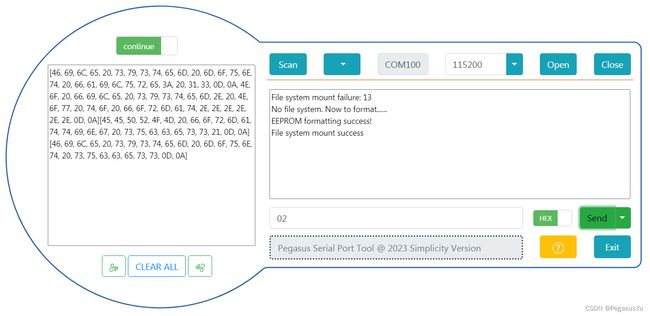
串口指令0x03测试效果如下:
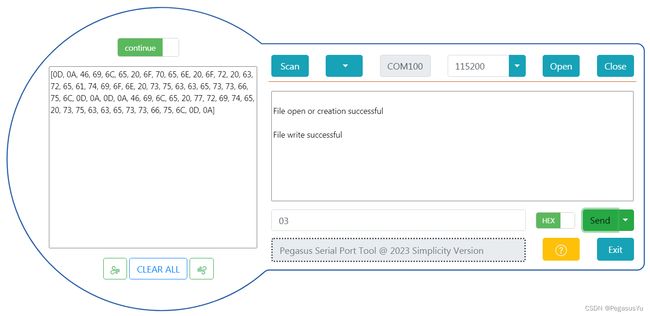
串口指令0x04测试效果如下:
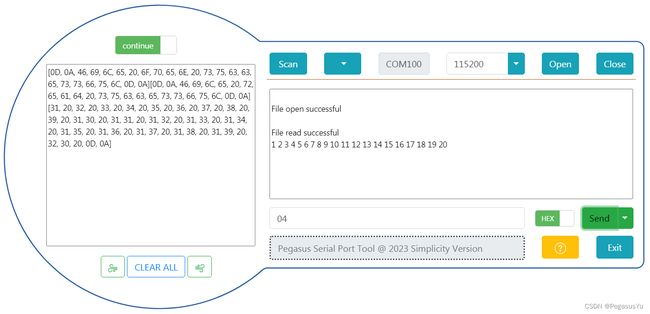
串口指令0x05测试效果如下:
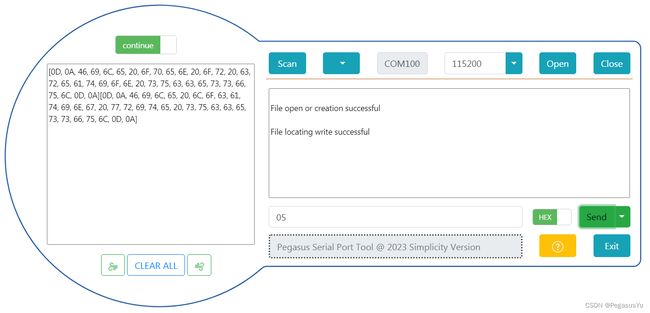
串口指令0x06测试效果如下:
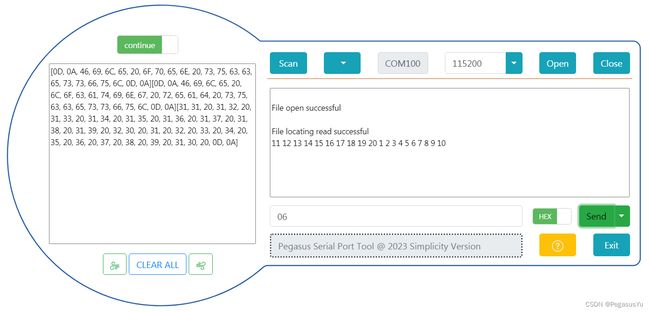
STM32例程下载
STM32F401CCU6 I2C总线FATS读写EEPROM ZD24C1MA例程下载
–End–
